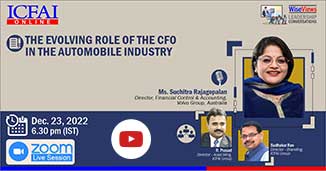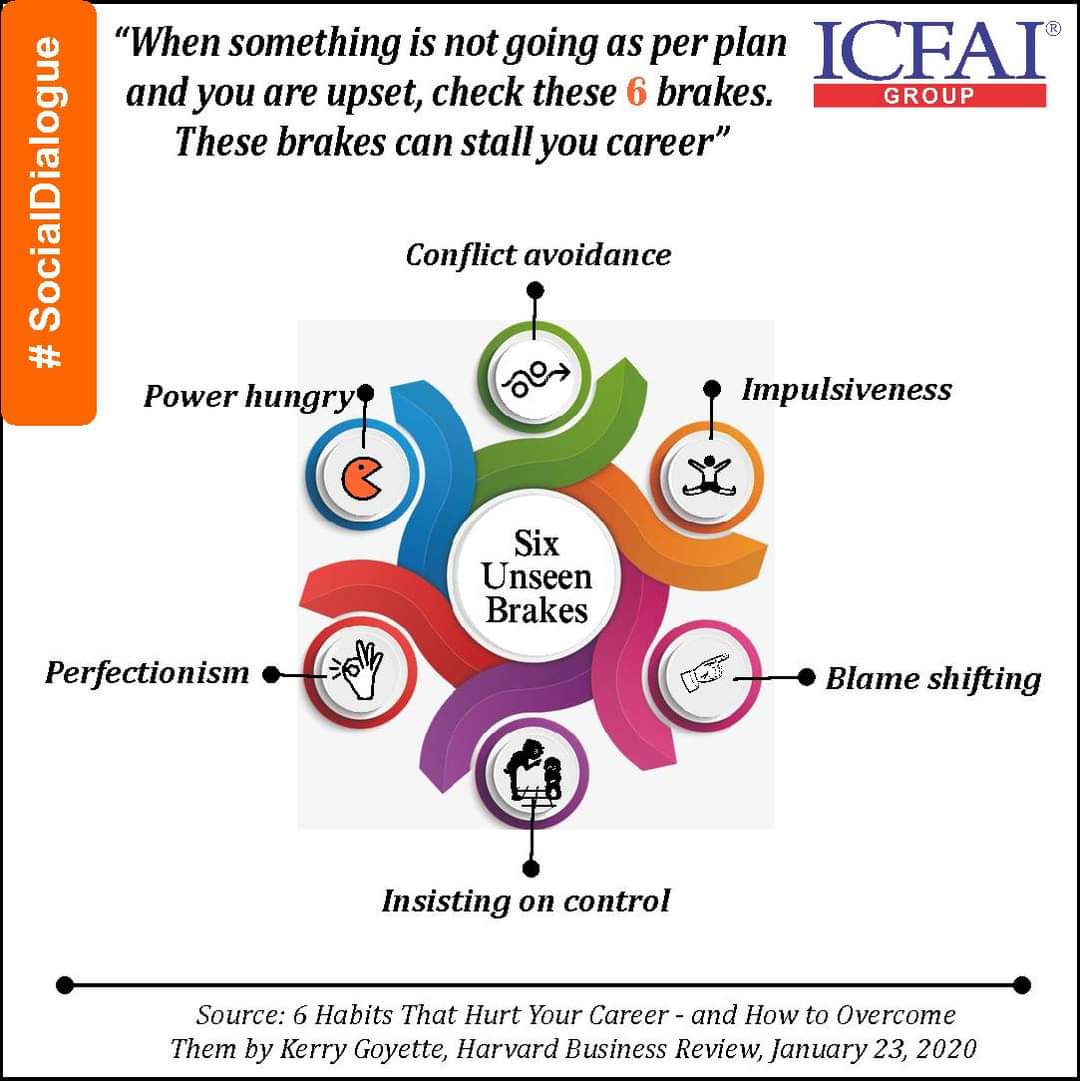
On Friday, Dec 23, we had an interesting webinar by Ms Suchitra Rajagopalan, a senior Finance executive with Volvo. Ms Rajagopalan shared her perspectives on the finance function and the emerging role of the CFO in a global automotive company.
About Ms Suchitra Rajagopalan
Ms Suchitra Rajagopalan is an achievement driven finance professional with global exposure to Business Control, Financial and Risk Management, Change Management, Corporate Governance, Shared Service Operations and Business Advisory Services. She is a strategic thinker with strong analytical and interpersonal skills. Ms Rajagopalan is an agile and enterprising executive who seeks new opportunities and is determined to excel. Ms Rajagopalan is also an accomplished communicator with exceptional networking skills. She is a result oriented professional with the energy and passion to drive change in a dynamic environment.
Career summary
Ms Rajagopalan is currently Director, Financial Control and Accounting, Volvo, Australia. She is also a member of the Executive Leadership Team and responsible for Financial Reporting, Accounting, Credit Management, Accounts Payable and Tax & Treasury functions.
Earlier, she was with Volvo, South Africa. In that role, she was a Member of the Executive Management Team and responsible for monitoring the business performance of Volvo Trucks in Southern Africa (including 5 export markets, 12 wholly owned dealers and 7 private dealers) and managing risk pertaining to the legal entity (incl. UD Trucks, Penta, Buses, 2 GTO Plants, Service Market Logistics, Production Logistics, etc.).
Ms Rajagopalan has also had stints in Volvo Turkey and Volvo, UK. On average, she has spent about 4 years in each country. This has given her enough time to make an impact while not remaining in one role for too long.
Ms Rajagopalan holds an MBA from Warwick Business School. She moved to the UK to do her MBA and quickly realized that it was also important for her to work overseas and gain global experience. That is how her career in Volvo began.
Different roles and different geographies
Different roles in different geographies have given Ms Rajagopalan a rich exposure to different aspects of management. Ms Rajagopalan has worked at both headquarters and in the markets. She has experience both in emerging and developed markets. As a result, she is a well-rounded professional. For example, in a head office role, she appreciates the challenges of people working in the markets. And in a markets role, she can better appreciate the kind of questions asked by headquarters. While working as an independent director with Redington, Ms Rajagopalan became more adept at corporate governance and developed expertise in asking the right questions of top management.
During the Q&A, Ms Rajagopalan added that we should take initiative and pitch for a new role even if we do not have prior experience. It is also important to be flexible when relocation is involved. Moving from one country to another is not easy. But that is how learning happens. Despite security concerns, Ms Rajagopalan decided to move to South Africa as it was an interesting market and would also give her exposure to other African countries. Turkey, which works like an emerging market but is geographically close to Europe, also gave her some interesting perspectives.
A career full of learning
Ms Rajagopalan through the course of her career, has adapted to different cultures and roles. She has embraced lifelong learning with a curiosity to keep learning by asking questions. She has realized the need to keep pace with legislation and new business models. She has learnt to go beyond her comfort zone. She has appreciated the importance of driving change (even at the cost of being unpopular) and continuous improvement. As a committed finance professional, she has understood the importance of understanding the business levers. When she began her stint in Volvo, auto was a new industry for her. But very quickly, by interacting with the business leaders, she has picked up a lot of business knowledge and understood how the auto value chain works.
It is important to have a growth mindset and keep thinking of moving to the next frontier. Ms Rajagopalan also believes that without risk there is no reward. We must manage risk and take informed decisions rather than say no to risk all the time. Over time, Ms Rajagopalan has learnt to strike a balance between enabling and supporting the business and playing the gatekeeper role of control and compliance. She also keeps asking whether the dealers and end customers are finding it easy to deal with Volvo’s systems. Ms Rajagopalan feels that execution is often more challenging than strategy formulation.
Cross functional collaboration
Like most large MNCs, Volvo has a matrixed organization. Various departments must work together for key initiatives. It is important not to pass the buck and instead focus on problem solving. For this, root cause analysis is important. It is not easy for differing groups to come together but without collaboration, it is difficult to get things done.
Networking
Ms Rajagopalan mentioned that networking is crucial for career success. As she likes to say, if we are not networkers, we will remain workers. Networking is particularly important if we are in a MNC away from headquarters. Only by having a good network can things get done in large organizations, with a phone call or two.
Focus areas for business/finance control
Profitable growth is the key. For this to happen, we must focus on the right metrics. For example, looking at truck sales alone does not give the complete picture. It is important to examine the whole life contribution. A lot of the profits are generated after the sale of the truck is over. It is also important to track profitability by customer.
The finance function is also playing a more proactive role when it comes to pricing. Earlier, it was more about reporting and post-mortem analysis. Business cycle management and downturn management are the other priorities. It is important to anticipate and be ready for downturns. Strategy and Business Intelligence are now part of the CFO organization in some companies.
Evolving CFO role
Increasingly, the CFO has to play the role of business partner and integrator, i.e., connecting the dots. From finance and risk management, it is increasingly becoming general management.
The CFO must be more familiar with evolving business models such as equipment as a service where the supplier continues to own the equipment and revenues are on usage basis. With the emergence of such new business models, Balance sheet management is becoming as important as P&L management
Capital allocation is another important area. It is important to strike a balance between the mature but declining ICE business and the fast-growing EV business. Sometimes, collaboration with competitors becomes necessary to optimize capital spending. Thus, Volvo and Daimler have a partnership for developing fuel cells.
Digitalization, automation, improving efficiencies through lean principles and implementation of the Volvo Production System are also important priorities. Ms Rajagopalan acknowledged the growing importance of AI. Volvo has a Group Truck Technology department as part of its organization which deploys AI for the group. However, there is a need to step up the usage by a couple of levels. Those companies which are lagging currently in AI, need not be despondent. They can leapfrog to the latest generation of technology.
During the Q&A, Ms Rajagopalan added that being a good CFO calls for a blend of business acumen and profitability along with a focus on risk, governance, and compliance. Sometimes, these priorities may pull us in different directions. But if we have a foundation of trust and integrity, such contradictions can be managed. One thing Ms Rajagopalan has realised is that at times it is necessary to be unpopular and hold your ground when the interests of the organization are involved.
Ms Rajagopalan also mentioned during the Q&A, that a CFO should have an end to end cross functional mindset. She should be able to see issues from different angles. Communication and articulation are key skills. Many finance professionals struggle to make an impact because they get caught up in routine work and do not communicate effectively.
Responding to a question, Ms Rajagopalan mentioned that people with an engineering/MBA background have the right foundation to build careers in finance. Engineering develops analytical abilities while in MBA, finance concepts can be learnt.
Today the CFO role, which the rich exposure it provides, can pave the way for moving into top management roles including the CEO. The CFO has a good understanding of finance. This combined with business acumen makes a CFO well positioned to move into the corner office.
Electric vehicles (EV) roadmap
By 2035, Volvo wants one third of the trucks to be running on EV technology. Australia was earlier lagging in EVs. But now with a new labour government in place, sustainability has gained a lot of importance in the country. After the US, Australia has the highest number of EV orders. EV involves a different business model, built around batteries, circularity and charging infrastructure. Today, the auto business depends on dealerships. How this will change with the emergence of EVs is something to be kept in mind.
Software
Volvo uses a combination of inhouse development and outsourcing. The global IT Infrastructure has been outsourced to HCL. Inhouse teams customize software available in the market for internal use. In the case of emerging areas like connected solutions, Volvo believes in developing internal capabilities as such solutions are core to the company and enable preventive maintenance using telematics.
Make in India
Volvo has strengthened its R&D presence in India with Bangalore becoming the next largest hub after Sweden. The company has a joint venture for manufacture with Eicher in Pithampur. However, manufacturing volumes can pick up more. There is some traction in mining but there is a long way to go in long haul trucks. Indeed, India has a lot of potential for manufacturing. However, government policies must become more investor friendly. India has a reputation for changing policies frequently. Stability in policies is important to attract foreign investments.
Universities
There is a shortage of engineering talent and the kind of skills required is also changing. For example, with the rise of EVs, auto electricians are in great demand in the industry. Volvo has partnerships with universities in Sweden and the UK to develop technical talent. It is working closely with think tanks and policy makers. The aim is to have a longer engagement with students from the time they are in school, pursue vocational education and finally join the employer.
On the importance of well-functioning boards
The board has an important role to play in the governance and effective running of the organization. Ms Rajagopalan has been on internal Volvo boards and learnt to respond to the demands of board members. She has learnt with experience that sometimes it is necessary to push back. At the same time as an independent director at Redington and a member of the Audit committee, she has focused on corporate governance and learnt to ask the right questions of top management. One important question she raised is: While there is a lot of hype about independent directors, are companies willing to listen to independent directors? Also, how independent are independent directors?

